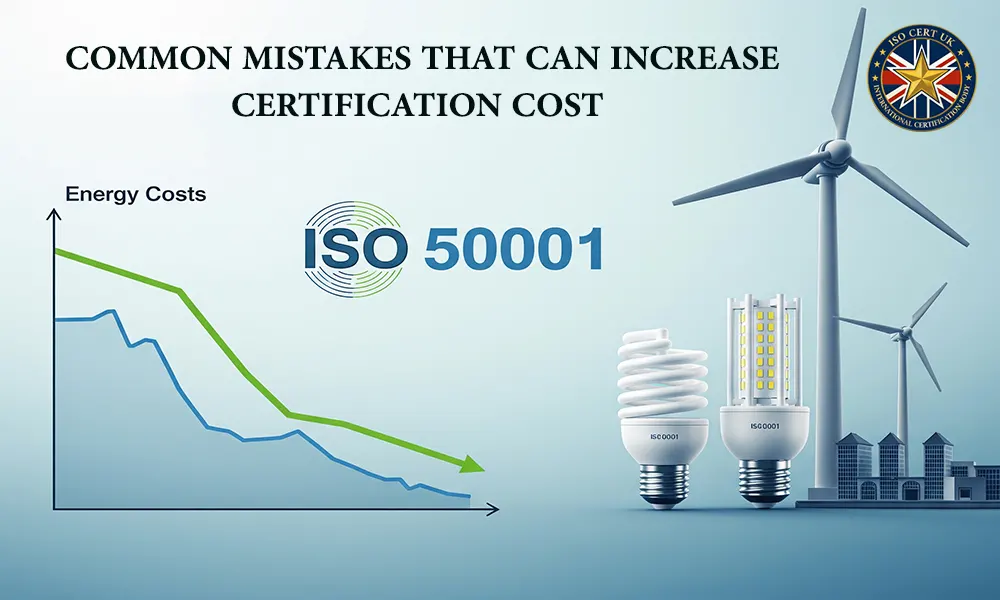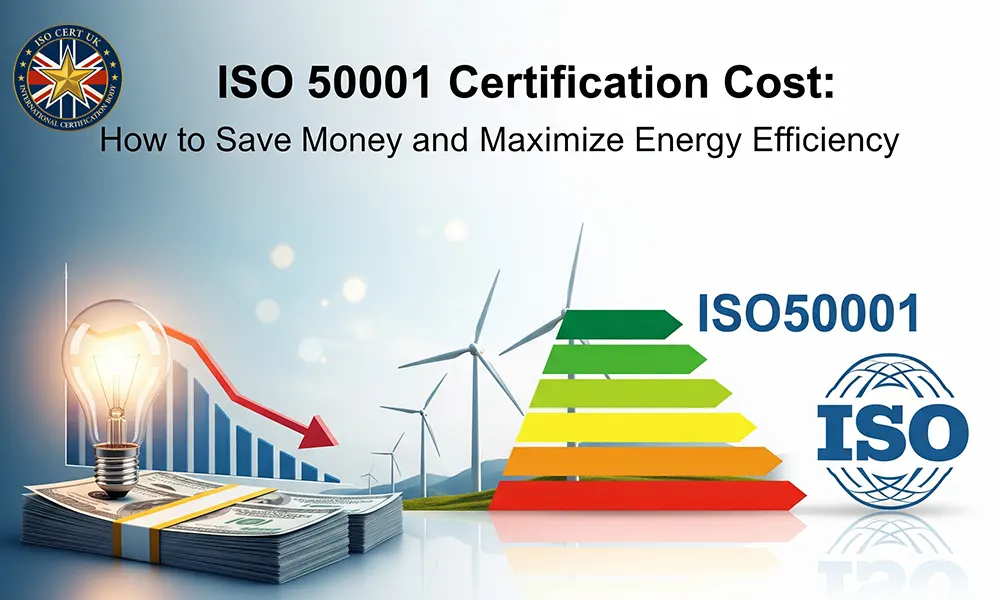Understanding the ISO 50001 certification cost is essential for any organization aiming to implement an energy management system (EnMS) and achieve compliance with ISO 50001:2018 requirements.
This comprehensive guide breaks down all the factors, typical expenses, and best practices for cost-effective certification. Whether you’re a small business or a large enterprise, knowing what influences the cost and how to maximize your return on investment (ROI) will help you make informed decisions and drive continual improvement in energy efficiency and operational costs.
What Is ISO 50001 Certification and Why Is It Important?
ISO 50001 is an international standard for Energy Management Systems (EnMS) that helps organizations improve energy efficiency, reduce costs, and comply with environmental regulations. Achieving ISO 50001 certification demonstrates your commitment to sustainable energy practices and operational excellence.
Key benefits include:
- Enhanced energy performance and operational efficiency
- Reduced energy consumption and operational costs
- Improved compliance with regulatory requirements
- Increased credibility with stakeholders and customers
- Stronger foundation for continual improvement and cost savings
Read more:
Ultimate Guide to ISO 50001 Energy Management System
What Factors Affect ISO 50001 Certification Cost?
Several factors can impact the total ISO 50001 certification cost for your organization:
-
Organization Size and Number of Sites
Larger companies or those with multiple locations require more extensive audits, increasing costs.
-
Current Energy Management Maturity
Organizations with existing energy management systems may need fewer adjustments, lowering expenses.
-
Scope of Certification
Whether the certification covers the entire organization or specific departments affects the price.
-
Audit Duration
Complex or large operations require longer audits, impacting the total cost.
-
Consultancy and Training Fees
Hiring experts to assist with system implementation and staff training adds to costs.
-
Ongoing Surveillance Fees
Annual fees for follow-up audits to maintain certification.
Typical Cost Breakdown for ISO 50001 Certification
Understanding the breakdown of ISO 50001 certification cost helps you budget accurately:
- Gap Analysis: Initial assessment to identify gaps in your current energy management system.
- Consultancy Charges: Fees for expert guidance, documentation, and implementation support.
- Training Expenses: Investment in staff training to ensure understanding of ISO 50001:2018 requirements and best practices.
- Documentation Preparation: Costs for developing and maintaining required documentation.
- Internal Audit: Expenses for conducting internal audits before the external certification audit.
- External Audit Fees: Charges from the certification body for the formal audit process.
- Surveillance Audits: Ongoing costs for periodic reviews to maintain certification status.
- Operational Costs: Any additional expenses related to improving energy efficiency or implementing corrective actions.
read:
iso 50001 gap analysis checklist
How to Reduce Your ISO 50001 Certification Cost
To optimize your investment and minimize unnecessary expenses:
-
Leverage Internal Resources
Train your team to develop and maintain the system, reducing reliance on external consultants.
-
Phase Implementation
Start with key departments before expanding to the entire organization.
-
Prepare Thoroughly for Audits
Organize documentation and processes to minimize audit time.
-
Compare Certification Bodies
Request quotes from multiple accredited bodies to find the best value.
ISO Cert International is your best partner throughout this journey, offering expert guidance at the most competitive costs. Our team ensures a smooth certification process tailored to your organization’s needs, helping you improve energy efficiency and reduce operational expenses.
contact us : info@iso-certs.uk
Steps to Obtain ISO 50001 Certification
Achieving ISO 50001 certification involves several key steps, each impacting the overall cost:
-
Assess Current Energy Management
Identify gaps between your existing system and ISO 50001 requirements.
-
Develop and Document the System
Establish policies, procedures, and records that comply with the standard.
-
Train Employees
Ensure staff understand and can implement energy management practices.
-
Conduct Internal Audits
Evaluate your system internally to find and fix issues.
-
Select a Certification Body
Choose an accredited organization to perform the external audit.
-
Pass the External Audit
Address any non-conformities identified during the audit.
-
Receive Certification
Upon successful audit completion, obtain your ISO 50001 certificate.
Benefits of Investing in ISO 50001 Certification
Investing in ISO 50001 certification cost delivers significant long-term value:
- Energy Cost Savings: Improved energy efficiency directly reduces operational costs.
- Regulatory Compliance: Meet legal and industry requirements with confidence.
- Enhanced Reputation: Certification signals commitment to sustainability and best practices.
- Operational Excellence: Streamlined processes and performance evaluation drive continual improvement.
- Competitive Advantage: Certification can open new market opportunities and strengthen client trust.
- Return on Investment: Long-term savings and improved efficiency often outweigh initial iso certification expenses.
Common Mistakes That Can Increase Certification Costs

Avoid these pitfalls to keep your ISO 50001 certification cost under control:
- Inadequate Preparation: Failing to conduct a thorough gap analysis or prepare documentation increases audit time and fees.
- Neglecting Training: Untrained staff may make costly errors during implementation or audits.
- Overreliance on Consultants: Excessive use of external consultants can inflate costs unnecessarily.
- Poor Documentation Management: Disorganized records lead to longer audits and potential non-conformities.
- Ignoring Continual Improvement: Lack of follow-up actions can result in recurring issues and additional expenses during surveillance audits.
How to Choose the Right ISO 50001 Consultant for Your Organization
Selecting the right consultant is crucial for a smooth and cost-effective certification process:
- Experience and Expertise: Look for consultants with proven success in ISO 50001 implementation and certification.
- Tailored Solutions: Choose a partner who customizes their approach to your specific industry and operational needs.
- Transparent Pricing: Request detailed quotes and clarify what is included in consultancy fees.
- Ongoing Support: Opt for consultants who provide support beyond certification, including surveillance audits and continual improvement guidance.
- References and Reviews: Check client testimonials and case studies to assess consultant effectiveness.
Why Trust ISO Cert International with Your ISO 50001 Certification?
At ISO Cert International, we understand that managing your ISO 50001 certification cost is just as important as achieving compliance. Our expert team provides end-to-end support, from initial gap analysis to full certification and continual improvement.
- Tailored Guidance: We offer customized consultancy, documentation support, and comprehensive training to fit your unique needs.
- Proven Results: Our clients benefit from cost savings, improved energy efficiency, and successful certification outcomes.
- Transparent Pricing: We provide clear, competitive quotes with no hidden fees.
- Ongoing Partnership: Beyond certification, we help you maintain compliance, optimize operational costs, and drive continual improvement.
Contact ISO Cert International today to start your ISO 50001 journey, optimize your certification investment, and unlock lasting energy management success.
Conclusion
Understanding and managing your ISO 50001 certification cost is key to achieving energy efficiency, regulatory compliance, and long-term savings. By considering all influencing factors, leveraging best practices, and partnering with experienced consultants like ISO Cert International, your organization can achieve certification smoothly and cost-effectively. Take the first step toward operational excellence and a sustainable future by investing in ISO 50001 certification today.
Frequently Asked Questions
How much does ISO 50001 certification cost?
The cost varies widely based on company size, industry, and current energy management status. Small businesses may spend a few thousand dollars, while large enterprises could invest significantly more. Factors such as consultancy, training, and audit fees all contribute to the total cost.
What factors affect the cost of ISO 50001 certification?
Key factors include company size, industry type, existing EnMS maturity, consultancy and training needs, documentation requirements, and the chosen certification body.
Is ISO 50001 certification cost-effective for small businesses?
Yes, small businesses can achieve certification cost-effectively by leveraging internal resources, streamlining documentation, and focusing on targeted energy efficiency improvements. The long-term savings often outweigh the initial investment.
What is included in the ISO 50001 certification cost?
Typical costs include gap analysis, consultancy, training, documentation, internal and external audits, and ongoing surveillance audits. Operational improvements to meet requirements may also be necessary.
How can I reduce the cost of ISO 50001 certification?
Early energy efficiency initiatives, in-house training, organized documentation, and comparing consultancy offers can all help reduce certification costs while maintaining compliance and continual improvement.
Ready to optimize your energy management system and control your ISO 50001 certification cost? Contact ISO Cert International now for a personalized consultation and unlock your organization’s full potential!

